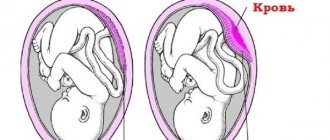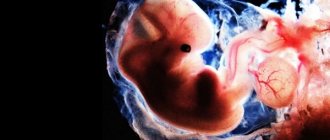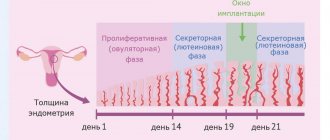Periodic pain in the lower abdomen visits a woman more than once during her life. However, what we call the “stomach” involves an entire system of organs, and therefore it can be difficult to identify the cause of the ailment on your own. And yet this is very important when it comes to the health of the expectant mother and her child.
During this interesting and difficult period, a woman may notice unusual sensations. Some causes of discomfort can be considered natural at certain stages of pregnancy. Others talk about pathology and demand to see a doctor. In the first part of the article, we will look at what physiological reasons can bring discomfort at different stages of pregnancy. And then we’ll try to determine which pains probably indicate pathology.
First trimester
The beginning of pregnancy often manifests itself by pulling the lower abdomen. This is a time when the female body undergoes natural changes. The uterus gradually stretches and shifts, and the surrounding tissues soften under the influence of hormones. The sensations are similar to painful menstruation - the lower abdomen pulls, and slight tingling may appear. Already in the early stages, some complain of pain in the pubic area - this is how a hormone called relaxin manifests itself. It is produced throughout pregnancy and affects, among other things, cartilage and ligaments1,3.
When nagging pain in the early stages is dangerous
Often, dangerous pregnancy pathologies that threaten the mother and fetus begin with minor discomfort. A woman’s lower abdomen simply feels a little tight during pregnancy, cramps occur, and there may be a little bleeding. And then the situation worsens sharply. Below are dangerous causes of abdominal pain.
Reason No. 1 - hypertonicity
Often girls have tightness in the lower abdomen during pregnancy in the 1st and 2nd trimesters. The uterus “turns to stone,” changes shape, and interferes with the baby. With strong tone, it literally squeezes the child and does not allow him to take the correct position. With hypertonicity, there is a high risk of spontaneous abortion. Therefore, the woman is kept in the maternity hospital and given medication treatment. Gynecologists in antenatal clinics monitor the tone of the uterus in all expectant mothers.
Reason No. 2 - anembryony
15 out of 100 pregnant women are diagnosed with this by ultrasound. It means that from the first weeks the fetus is not viable. Nagging pain, vomiting and nausea are characteristic signs of anembryonia. But they have nothing to do with pregnancy: the breasts do not change, there is no toxicosis.
Reason No. 3 - early birth
If you're experiencing tightness in your lower abdomen when you're less than 37 weeks pregnant, your baby may have already decided to come. The pain and cramping intensify and turn into irregular contractions - count them. If they become less chaotic, this means you are in labor. Don't wait until contractions become regular - call your doctor.
Second trimester
The pressure on the ligaments in the pelvis and pelvic bones increases. Therefore, in the second trimester, especially towards the end, sprains manifest themselves as sharp, short-term pain when changing body position. Sometimes it is enough to simply sneeze or cough to cause such pain.
Also, at the end of the trimester, the body begins to prepare for future childbirth, and periodically “scares” the pregnant woman with training contractions. They rarely cause discomfort, but if the uterus is particularly tense, brief stretching in the lower abdomen may occur.
In this trimester, the baby is already developed enough to start pushing. Thrusts in the lower abdomen, especially near the bladder, may be painful but not dangerous1.
Pain during ectopic pregnancy and threatened miscarriage
The occurrence of an ectopic pregnancy cannot be judged only by symptoms, which include pain in the lower abdomen and bleeding. But these are clear signals for an urgent visit to a doctor, who will perform an ultrasound and determine their true cause. Most often, ectopic pregnancy is localized in the tubes. As the embryo develops and stretches the walls of the fallopian tube, pain occurs. They become more frequent and intensified, unlike obstetric pain.
If there is a threat of miscarriage, which can happen at any stage of pregnancy, the pain is localized in the center of the lower abdomen and is accompanied by contractions. Intuitively, many women, especially those with childbirth experience, can distinguish training contractions and obstetric pain from pathological ones. But if a pregnant woman notices unnatural pain in her abdomen (especially in the center), then it is better for her to play it safe by contacting a doctor, at least by phone to describe her condition. The threat of miscarriage also arises when uterine bleeding occurs, which is also accompanied by a sharp loss of strength.
Third trimester
At this time, the uterus begins to actively stretch as the fetus grows. It puts pressure on the internal organs, especially the intestines, which slows down its proper functioning. The cause of pain in the intestines is also hormonal changes, dietary errors, and limited physical activity. A woman may feel discomfort associated with impaired digestion. Most often, dull pain, distension and tingling will be on the left side of the lower abdomen, and sometimes accompanied by additional symptoms of intestinal disorders - bloating, constipation, dysbacteriosis. It will be useful for the expectant mother to improve her diet, give up fatty and sweet foods in favor of vegetables and fruits, and take leisurely walks in the fresh air1.
Pregnancy: answers to frequently asked questions
Due to lack of time among doctors, or due to some other reasons, certain points still remain not fully clarified. We will try to highlight some questions the answers to which may interest you.
Read more
Acute appendicitis - inflammation of the appendix
The appendix is located in the lower right abdomen, but as pregnancy progresses, it gradually moves to the upper abdomen.
The disease begins with sudden and sharp pain in the abdomen, but then the pain becomes aching and moves to where the appendix is located. When lying on the right side, the pain intensifies due to the pressure of the pregnant uterus on the inflamed appendix.
The pain is often accompanied by nausea and vomiting, and increased body temperature.
If timely medical care is not provided, peritonitis develops: body temperature rises, abdominal pain intensifies, and vomiting does not bring relief.
Cholecystitis - inflammation of the gallbladder
Characterized by pain and a feeling of heaviness on the right side under the rib. When the fetus moves, the pain may intensify.
Bitterness in the mouth, heartburn, nausea and/or vomiting, belching of air, and bloating often occur.
In acute cholecystitis (attack), the pain is cramping. An attack can be triggered by shaking while driving or dietary errors (eating fatty, fried and/or fatty foods).
In chronic cholecystitis, the pain is dull and aching, periodically intensifying and subsiding.
Pancreatitis - inflammation of the pancreas
The pain is located in the upper abdomen (episgastric region, right or left hypochondrium). It can be encircling, covering not only the stomach, but the back area. Often accompanied by nausea/vomiting, bowel dysfunction (usually diarrhea).
Acute pancreatitis: pain is severe, sharp, cramping or throbbing.
Chronic pancreatitis: aching pain, aggravated by errors in nutrition.
Cystitis - inflammation of the bladder
Acute cystitis
The pain is cutting, combined with frequent urination and the release of urine in small portions. False urge to urinate often occurs.
Chronic cystitis
The pain is nagging, intensifying when the bladder is full and reaching its greatest intensity at the end of urination. Characterized by heaviness in the lower abdomen - right above the pubis.
Placental abruption
Abdominal injuries during pregnancy, severe toxicosis in the later stages, labor abnormalities, high blood pressure and other factors can lead to premature placental abruption. This anomaly can develop both in later stages and immediately before childbirth.
The doctor may suspect premature detachment on the basis of increased tone and altered shape of the uterus, abdominal pain, and increasing oxygen deficiency of the fetus. Externally, you can notice bloating and pale skin. Weakness, dizziness and vomiting appear, often bleeding.
Even the most harmless signs of illness need the attention of a doctor. Therefore, it is advisable for expectant mothers not to let the situation take its course. If your lower abdomen hurts during pregnancy, it is better to immediately find out the cause2,3.
Womenfirst
- Gynecology: national guide / ed. G.M. Savelyeva, G.T. Sukhikh, V.N. Serova, I.B. Manukhin, V.E. Radzinsky.-2nd ed., revised. and additional - M.: GEOTAR-Media, 2021. - 1048 p.
- Murtazin A.I. Obstetrics and gynecology. Standards of medical care. Quality assessment criteria. Formulary. 2020 (electronic version)
- Early pregnancy: complications and prediction of perinatal outcomes Nigmatova G.M., Kuzieva Yu.M. 2021 / Biology and Integrative Medicine
RUS2124800-2 from 03/20/2020
Life-threatening conditions
There are situations that pose a threat to the life of the fetus and its mother. Here they are:
- Miscarriage. It can happen before the 20th week. First, the pregnant woman starts bleeding, after which the lower abdomen pulls during pregnancy. Usually pain does not occur immediately, but after several hours or days. Do not ignore even scanty bleeding - call your doctor;
- Ectopic pregnancy. The egg does not attach to the wall of the uterus, but to a tube or other place. At first, the woman does not feel anything: she develops toxicosis, increased breast sensitivity and other signs of an interesting situation. But as the embryo grows, alarm bells appear: nagging pain, severe cramps, bleeding. The embryo grows, but the tube does not adapt to its size, because it is not elastic and does not stretch. If pathology is not detected in a timely manner, the pipe may rupture. This is an extremely dangerous situation. Alas, it is impossible to save the fetus, but the woman needs to be saved - and urgently. Therefore, if you notice the listed symptoms, immediately contact your gynecologist;
- Placental abruption. It can be partial or complete. The symptoms depend on this. With partial detachment, slight bleeding begins and pulls in the lower abdomen during pregnancy, with complete detachment - massive bleeding and acute pain in the uterus and back. You may notice that your baby has become less active.
The situation is extremely dangerous! Call an ambulance immediately!
When you need medical help
When a pregnant woman experiences abdominal pain, the main thing is not to panic and try to adequately assess its nature and your general condition. Nagging abdominal pain during early pregnancy does not require treatment or other medical intervention if:
- the stomach hurts monotonously and not constantly, there is no acute or cramping pain;
- there is no increase in pain;
- there is no impact on the woman’s usual lifestyle;
- after a short rest in a supine position, the pain subsides;
- there is no bleeding from the genitals.
You don’t have to worry about the danger if, against the background of abdominal pain, there are no signs of disruption to the functioning of other organs and systems (stool upset, nausea or vomiting, fever, lightheadedness or loss of consciousness, decreased blood pressure, increased sweating, rapid heartbeat).
In the absence of contraindications or threatening symptoms, No-shpa will help cope with physiological pain.
Reasons to call an ambulance in the early stages of pregnancy are:
}
- sharp pain, the severity of which does not decrease after taking a horizontal position;
- increased pain;
- cramping nature of pain;
- increased pain when pressing;
- bloody discharge of any intensity.
Loss of appetite, nausea or frequent vomiting requires consultation with a doctor and a comprehensive examination.










